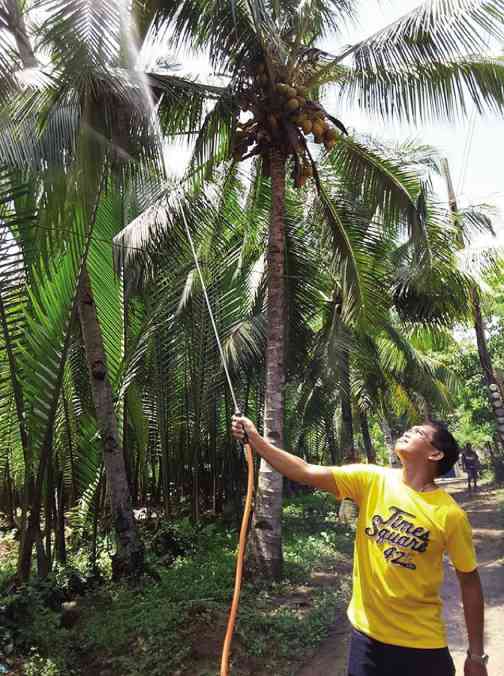‘Cocolisap’ wreaks havoc in Basilan

A government worker sprays nontoxic solution to cocolisap-infected trees in Basilan. PINOL FACEBOOK PAGE
ZAMBOANGA CITY—Farmers in Basilan are cutting down thousands of coconut trees infected by cocolisap, a pest that is preventing the trees from bearing fruit and now destroying the main source of livelihood of hundreds of families in the province.
Basilan Gov. Jim Salliman Hataman said the cocolisap infestation now “almost covers the entire province.”
Farmers dependent on the coconut industry in the province, said Hataman, are “going hungry” because they have no other source of livelihood.
The infestation started in 2007, when there were still up to seven million coconut trees in the province, said Hataman. Cocolisap has attacked more than half of the number of trees, he said.
According to the governor, only the island municipalities of Tabuan Lasa and Muthamad have not been hit by cocolisap “maybe because they are not connected to the mainland.”
Article continues after this advertisementBasilan is a major producer of coconut aside from rubber.
Article continues after this advertisement“The President wants this problem to be addressed immediately,” said Agriculture Secretary Emmanuel Pinol, in a phone interview.
He said the Department of Agriculture is now working closely with the Philippine Coconut Authority (PCA) to first determine the actual extent of the damage brought by cocolisap and to determine what past officials had done to address the problem.
“We are looking deeper here, we need to know what actions have been done in the past and why this problem persists,” said Pinol.
In a Facebook post on Monday, Pinol said it was “established that the very slow government reaction and action on the infestation of the Coconut Scale Insect (CSI) or cocolisap caused the P12-billion damage to the industry in the Bicol and Calabarzon regions and now threatens coconut farms in Mindanao as well.”
He said the cocolisap crisis first emerged in Basilan in 2007 and the insects are “believed to have been brought in by unwitting carriers, who came from Indonesia.” But the government then, according to Pinol, did not immediately act.
At a meeting of agriculture officials under the DA-led regional technical working group on the cocolisap crisis, Pinol said “it was established that poor monitoring, slow reaction and tedious government processes in the procurement system caused the spread of the cocolisap infestation in the country.”
Pinol said from 2010 to 2012, the PCA had already raised the red flag on cocolisap in Basilan and requested for fund assistance.
The funds came in only in 2014, or at least four years later when the infestation “already spread to an estimated 600,000 hectares in Basilan,” said Pinol.
“After that, there was no stopping the spread of cocolisap all over Basilan,” he said.
Pinol said the DA technical working group, formed to address the cocolisap crisis, had identified several measures to combat the spread of the pest. Among these is to cut coconut trees that could no longer be saved.
He said trees that could still be saved could be cured by injecting anti-cocolisap chemicals into their trunks or “root absorption.”
“Whichever proves to be more effective will be utilized in future operations,” said Pinol.
Pinol said new trees must be planted in areas where sick trees had been cut down. Alternative crops would be made available to farmers.
He said although there’s still a need to go through processes, “action must be very fast and work must be done even on Saturdays, Sundays and holidays.”
“This is what I believe President Duterte’s message is: Government must be decisive and fast in responding to the cries for help of the people,” said Pinol. —JULIE ALIPALA